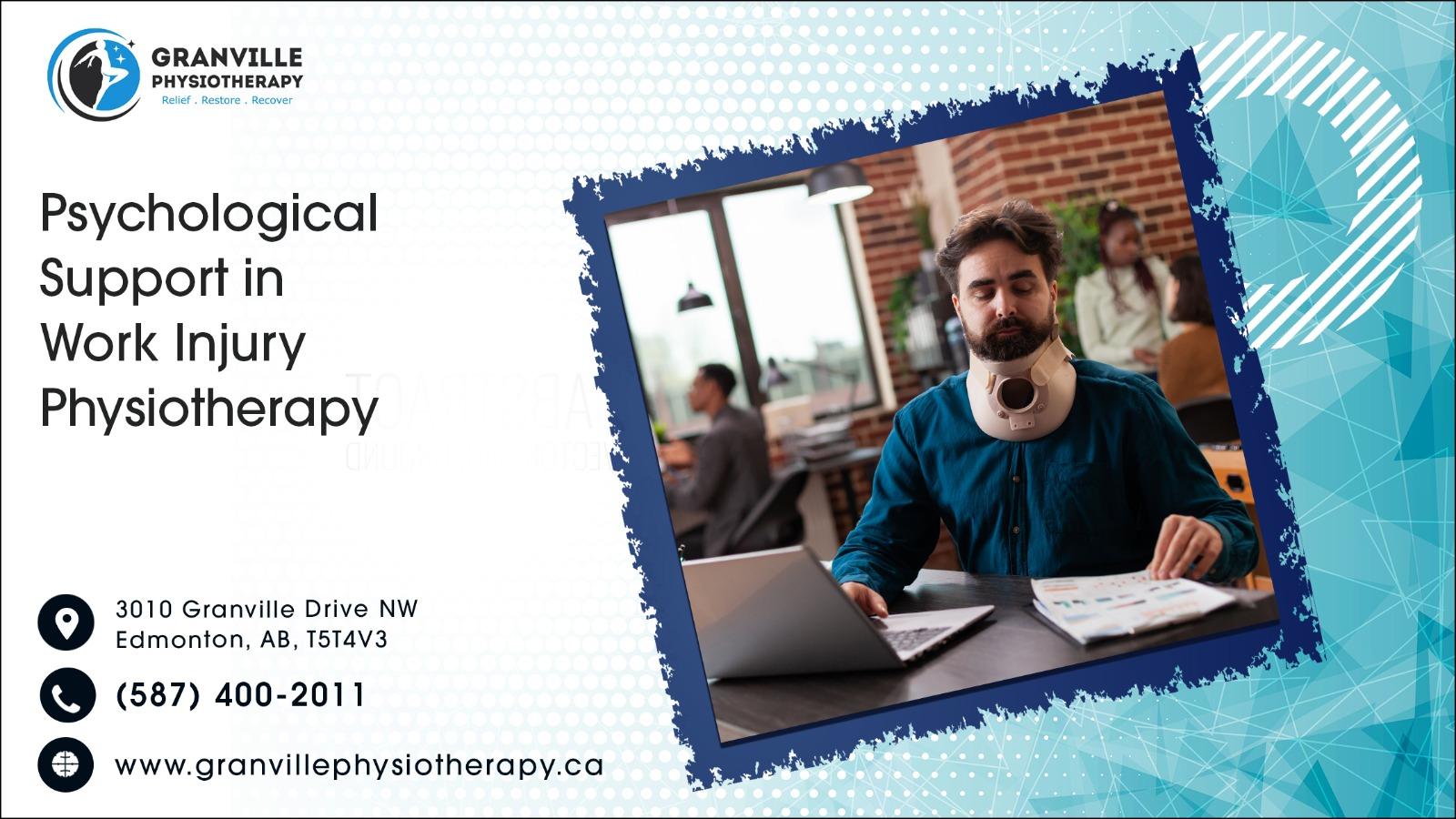Workplace injuries can be a significant setback for any employee, impacting not just their physical health but also their psychological well-being. In Edmonton, the approach to work injury physiotherapy extends beyond the physical rehabilitation of injuries. Clinics like Granville Physiotherapy emphasize the importance of psychological support as a part of the holistic treatment for workplace injuries. This comprehensive approach is crucial in addressing the multifaceted challenges that injured workers face during their recovery journey.
Understanding the Impact of Work Injuries
Work injuries can range from acute incidents, like falls or lifting injuries, to chronic issues, such as repetitive strain injuries. These physical injuries often come with psychological burdens, including anxiety, depression, or stress, particularly if the injury leads to prolonged absence from work, financial strain, or changes in job responsibilities.
Addressing Psychological Aspects of Work Injury Through Physiotherapy
Anxiety and Fear of Re-Injury
Gradual exposure to work-like activities helps desensitize the fear response, allowing patients to regain trust in their body's capabilities. Therapists often use simulation exercises that mimic workplace tasks to help patients overcome apprehension. Additionally, educating patients about safe work practices and injury prevention plays a vital role in alleviating these fears.
Stress Management
To effectively manage stress, techniques such as guided imagery and progressive muscle relaxation are introduced. Patients also receive education on how stress affects the body physiologically and learn various strategies to cope with it. Additionally, group therapy sessions provide a platform for individuals to share their experiences and coping mechanisms with peers facing similar challenges.
Depression and Low Mood
Regular physical activity as part of physiotherapy can release endorphins, naturally improving mood. Setting achievable goals helps patients see tangible progress, which can be uplifting and motivating. The therapist’s role in providing a supportive and empathetic environment can also significantly impact a patient's mood and outlook.
Coping with Pain
Cognitive-behavioral strategies are employed to alter negative thought patterns related to pain. Patients learn pain modulation techniques, understanding that how they perceive pain can change their response to it. Education about the pain cycle helps in demystifying pain and reduces its overwhelming power.
Impact on Self-Identity and Self-Esteem
Therapists help patients focus on their strengths and abilities rather than limitations, fostering a sense of empowerment. Success in therapy, even in small steps, can significantly boost self-esteem and aid in identity rebuilding. Additionally, therapists may collaborate with patients to explore new hobbies or activities that can be pursued despite limitations, further enhancing self-esteem.
Sleep Disturbances
Sleep hygiene education is provided, which includes tips on creating a conducive sleep environment and establishing a pre-sleep routine. Relaxation techniques specifically aimed at enhancing sleep quality are taught. Therapists might sometimes collaborate with sleep specialists for more complex sleep issues.
Enhancing Resilience and Coping Skills
Resilience training is a critical part of rehabilitation, helping patients develop the ability to adapt to changes and challenges resulting from their injury. Therapists often incorporate techniques to boost resilience, such as teaching problem-solving skills and fostering a growth mindset. This empowers patients to handle future stresses more effectively, improving their overall ability to cope with the demands of work and life.
Social Isolation
Encouraging participation in community activities or hobbies can help patients rebuild social connections. Therapists might also facilitate introductions to support groups where shared experiences can create a sense of community. Involvement in group physical activities, as appropriate, can also provide social interaction and foster connections.
Cognitive Functioning
Cognitive exercises tailored to the individual's specific challenges are integrated into the therapy sessions. Strategies to improve concentration, memory, and problem-solving are taught, which are beneficial for those returning to cognitively demanding jobs. Collaboration with neuropsychologists or occupational therapists may be considered for comprehensive cognitive rehabilitation.
Importance of Early Intervention
Early intervention in work injury physiotherapy, which includes psychological support, can lead to more effective and faster recovery. Addressing the psychological aspects early in the treatment could prevent the development of chronic pain and disability, which are often exacerbated by psychological factors.
Long-Term Benefits of Psychological Support
Incorporating psychological support in work injury physiotherapy offers long-term benefits:
- Reduced Risk of Chronic Pain: Addressing psychological factors early in the treatment process can significantly decrease the likelihood of an injury leading to chronic pain, which is typically more challenging to treat.
- Better Return-to-Work Outcomes: Providing psychological support also enhances the prospects of successful return-to-work outcomes, as it better prepares patients mentally for reintegration into the workforce.
- Improved Overall Well-being: The comprehensive approach adopted in therapy ensures overall well-being, enabling patients to recover physically, mentally, and emotionally, contributing to their holistic health.
A Comprehensive Approach to Work Injury Recovery
Work injury physiotherapy in Edmonton, particularly at clinics like Granville Physiotherapy, is evolving to recognize the importance of psychological support in rehabilitation. This holistic approach not only aids in the physical recovery from workplace injuries but also addresses the mental and emotional challenges that come with them. By treating the patient as a whole, physiotherapy can provide a more effective and complete recovery, preparing workers not just to return to their jobs but to do so with a renewed sense of confidence and resilience. This comprehensive care is what sets apart modern physiotherapy practices and underscores the importance of psychological support in the realm of work injury rehabilitation.
Also read about:
Best Furniture at Hoc Furniture
How to choose the best furniture shop in uae
Best Contract Review Lawyer in UK










